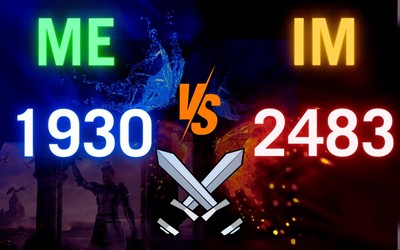
Gamma Waves Vs Brain Vs Chess
How The Fastest Waves In Your Brain Works : How Gamma Waves Affect your BrainHow Gamma Waves Affect Your Brain and Chess Performance
Gamma waves are the fastest brain waves produced by your brain. They range from 40 Hz to 100 Hz and are associated with high-level cognitive functions, such as problem-solving, learning, memory, and attention. Gamma waves also play a role in sensory integration, meaning they help your brain process information from different senses and regions. In this post, we will explore how gamma waves change your brain waves, how they improve your brain, and how they can boost your chess skills.
How Gamma Waves Change Your Brain Waves
Your brain produces different types of brain waves depending on your state of consciousness, activity, and mood. These brain waves are measured by electroencephalography (EEG) and can be classified into five categories: delta, theta, alpha, beta, and gamma. Delta waves are the slowest and occur during deep sleep. Theta waves occur during light sleep, meditation, and daydreaming. Alpha waves occur when you are relaxed and alert. Beta waves occur when you are awake, focused, and busy. Gamma waves occur when you are intensely concentrated, engaged, or excited.

Gamma waves are not independent of other brain waves. In fact, they often coexist and interact with them. For example, when you are learning something new, your brain produces both beta and gamma waves. Beta waves help you focus on the external stimuli, while gamma waves help you process and integrate the information. When you are meditating, your brain produces both theta and gamma waves. Theta waves help you enter a state of relaxation and awareness, while gamma waves help you achieve a state of insight and clarity.
Gamma waves can also modulate and synchronize other brain waves. This means they can influence the frequency, amplitude, and phase of other brain waves, creating a harmonious and coherent brain state. This is important for cognitive functions that require coordination and integration across different brain regions, such as memory, attention, and perception.

How Gamma Waves Improve Your Brain
Gamma waves have been linked to various benefits for your brain, such as:
- Enhanced cognitive abilities. Gamma waves can improve your mental performance, such as problem-solving, reasoning, creativity, and intelligence. They can also enhance your memory, both short-term and long-term, by facilitating the encoding, consolidation, and retrieval of information. Gamma waves can also boost your attention span, focus, and concentration, by filtering out irrelevant distractions and enhancing your awareness of relevant stimuli.
- Increased emotional well-being. Gamma waves can improve your mood, happiness, and optimism, by stimulating the release of neurotransmitters, such as dopamine, serotonin, and endorphins. These chemicals are responsible for creating positive feelings and reducing stress, anxiety, and depression. Gamma waves can also increase your empathy, compassion, and altruism, by activating the regions of your brain involved in social cognition and emotional regulation.
- Improved physical health. Gamma waves can improve your immune system, by reducing inflammation and increasing the production of antibodies. They can also improve your nervous system, by promoting neurogenesis, neuroplasticity, and neuroprotection. These processes are essential for the growth, adaptation, and repair of your brain cells. Gamma waves can also improve your cardiovascular system, by lowering your blood pressure and heart rate.

How Gamma Waves Boost Your Chess Skills
Chess is a complex and challenging game that requires a combination of cognitive, emotional, and physical skills. Chess players need to analyze the board, calculate the best moves, anticipate the opponent’s strategy, manage their time, and cope with stress and pressure. All these skills depend on the optimal functioning of your brain, and gamma waves can help you achieve that.
Studies have shown that chess players have higher levels of gamma waves than non-players, especially during difficult chess matches. This suggests that chess players have better cognitive abilities, such as memory, attention, and problem-solving, than non-players.Chess players also have higher levels of theta waves, which indicate a state of flow and relaxation
Moreover, gamma waves can help you improve your chess skills by enhancing your learning and memory. Chess involves memorizing numerous combinations of moves and their potential outcomes, as well as recognizing patterns and strategies. Gamma waves can help you encode, consolidate, and retrieve this information more efficiently and effectively. Gamma waves can also help you integrate the information from different senses and regions of your brain, such as visual, spatial, and logical.
Additionally, gamma waves can help you improve your emotional well-being and resilience while playing chess. Chess can be a stressful and frustrating game, especially when you face a strong opponent or make a mistake. Gamma waves can help you regulate your emotions, cope with stress, and maintain a positive attitude. Gamma waves can also help you empathize with your opponent and respect their moves, which can improve your sportsmanship and social skills.
How to Increase Gamma Waves
There are several ways to increase your gamma waves, such as:
- Meditation. Meditation is one of the most effective and natural ways to increase your gamma waves. Studies have shown that experienced meditators, such as Buddhist monks, can produce high levels of gamma waves, especially during states of compassion and insight. Meditation can also help you train your attention, awareness, and mindfulness, which are conducive to gamma wave production.
- Music. Music can also stimulate your gamma waves, especially music that is complex, rhythmic, and emotional. Music can activate multiple brain regions and networks, creating a rich and integrated sensory experience. Music can also enhance your mood, motivation, and creativity, which are related to gamma wave activity .
- Brain stimulation. Brain stimulation is a technique that uses electrical or magnetic pulses to stimulate specific brain regions or networks. One type of brain stimulation that can increase your gamma waves is transcranial alternating current stimulation (tACS). This method applies a weak alternating current to your scalp, which can entrain your brain waves to a desired frequency. Studies have shown that tACS can enhance your cognitive functions, such as memory, attention, and learning, by increasing your gamma waves .

- Nootropics. Nootropics are substances that can enhance your brain functions, such as cognition, mood, and memory. Some nootropics that can increase your gamma waves are:
- L-theanine. L-theanine is an amino acid found in green tea, which can increase your gamma waves by stimulating the production of GABA, a neurotransmitter that promotes relaxation and calmness.
- Bacopa monnieri. Bacopa monnieri is a herb that can increase your gamma waves by enhancing the activity of acetylcholine, a neurotransmitter that is involved in learning, memory, and attention.
- Huperzine A. Huperzine A is a compound extracted from a plant that can increase your gamma waves by inhibiting the enzyme that breaks down acetylcholine, thus increasing its availability and effectiveness.
Conclusion
Gamma waves are the fastest brain waves produced by your brain. They are associated with high-level cognitive functions, such as problem-solving, learning, memory, and attention. They also play a role in sensory integration, meaning they help your brain process information from different senses and regions. Gamma waves can change your brain waves, improve your brain, and boost your chess skills. By increasing your gamma waves, you can enhance your mental and physical performance, well-being, and health.




